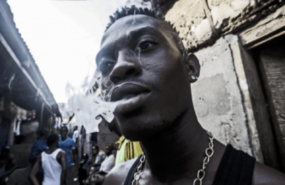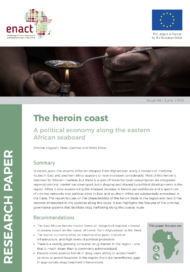Beyond the ‘migrant crisis’, Europe should recognise the threat posed by illicit markets in Libya.
Speaking in Geneva recently, the head of Libya’s National Oil Company, Mustafa Sanalla, launched an impassioned plea to European partners to help his country combat fuel smuggling.
The practice of smuggling heavily subsidised fuel from Libya (fuel in Libya costs as little as US$0.02c/0.03c per litre) is costing the country an estimated US$750million a year. Sanalla emphasised that the proliferation of fuel smuggling, and the organised criminal networks behind parts of it, are undermining Libya’s social fabric and the country’s ongoing state-building process.
This illicit activity is by no means a new phenomenon in Libya. Cheap fuel has been seeping out of the country’s land borders with Tunisia, Niger, Chad, Sudan and Egypt for decades. However, the collapse of law and order and the propagation of armed militias after 2011 enabled various warlords, together with local and international high-level criminals, to industrialise and vastly expand the business.
The most significant development in this respect has been the emergence of large-scale, sea-bound fuel smuggling to Europe and Turkey onboard fuel tankers: particularly off the west coast of Libya. Over the past seven years, the area has seen the development of significant syndicates headed by militia leaders with various interests in the black economy: from fuel smuggling to weapons, drugs, and human smuggling.
Fuel smuggling from Libya is costing the country an estimated US$750million a year
In spite of the country’s continuing problems, Sanalla’s plea for action is not an isolated example of Libya’s efforts to respond to this threat. For almost two years now, the Fuel and Gas Crisis Committee has been coordinating law enforcement activities against different forms of smuggling, forging partnerships with different able and willing national and local entities.
Similarly, in March, Attorney General Sadik Al-Sour published a list of 200 wanted smugglers, traffickers and middle men. The scale of the list and the profile of some of the names make it unlikely that it would be pursued exhaustively. Doing so could prove destabilising and provoke conflict across various parts of the Tripolitania. However, the process of naming and shaming has sent a powerful message.
This momentum is not to be taken for granted. The tentative push-back remains an overwhelmingly uphill struggle. Moreover, the general political situation remains as volatile as ever, especially with the uncertainty surrounding the health of the east’s strongman, Khalifa Haftar.
The island of Malta, which has been a recipient of fuel smuggled from Libya, is just 350 km north of Tripoli. Despite the proximity of this activity to European shores, and given evident self-interest in degrading such threats, the EU has not so far engaged seriously with willing Libyan partners on this issue. The outlook to Libya has instead been blinkered by the more pressing priorities of terrorism and migration.
Cheap fuel has been seeping out of Libya’s land borders with Tunisia, Niger, Chad, Sudan and Egypt for decades
In his speech in Geneva, Sanalla put his finger on this anomaly when he urged the EU to expand the mandate of its maritime policing initiative, Operation Sophia, to also include fuel smuggling. To date, Operation Sophia is tasked with training the Libyan Coastguard and navy to boost its capacity to intercept migrants, combat human smugglers and assist with the policing of the UN arms embargo on Libya.
Sources close to the operation say that behind the scenes, Sophia has been passing intelligence relevant to human smuggling to the Libyan authorities. But this sort of gesture is limited and largely anonymous. It has done nothing to mitigate Libyans’ anger over Europe’s expectation for the country to step up the policing of irregular migration, while refusing to use its flotilla to stop, search, and detain vessels engaged in fuel smuggling.
Italy recognised this frustration early on and understood that this could undermine cooperation from Libya in the response to human smuggling. Rome agreed to add fuel smuggling to the memorandum of understanding it signed with the UN-sanctioned Government of National Accord in February 2017. In October of that same year, Italian prosecutors started issuing charges against a major fuel smuggling ring that operated from Sicily, Malta and the coastal town of Zuwara. In August, one of the Libyan kingpins in that network, Fahmi Slim, was apprehended in Libya in an unrelated operation.
Europe’s outlook to Libya has been blinkered by the more pressing priorities of terrorism and migration
Following the seismic shock of the 4 March elections in Italy, it remains uncertain what the new Italian government will look like – let alone what its position on Libya might be and whether it would still retain a leading role in Libya. It is not clear, either, whether Paris – which has been vying to take Italy’s spot in Libya for some time now – would place fuel smuggling on its agenda.
It is clear, however, that the EU as a bloc has not yet responded to the threats stemming from organised crime in Libya with a broad, coherent and unified policy. What is currently on the table is arguably a piecemeal response addressed at the narrow priorities pursued by dominant member states.
Sanalla’s point about fuel smuggling can be made about most other smuggling markets. They all serve to undermine the Libyan state; and therefore contribute to the greater strategic threat that the ‘Somalisation’ of this troubled North African country would pose to the Mediterranean and Europe.
Europa debería reconsiderar su política sobre el problema de la delincuencia organizada en Libia
Más allá de la “crisis migratoria”, Europa debería reconocer la amenaza que plantean los mercados ilícitos en Libia.
En un discurso pronunciado recientemente en Ginebra, Mustafa Sanalla, presidente de la Compañía Nacional de Petróleo de Libia, le suplicó vehementemente a sus socios europeos que ayuden a su país a combatir el contrabando de combustible.
El tráfico ilícito de combustible desde Libia (un recurso altamente subsidiado, con un valor en Libia de tan sólo 2 o 3 centavos de dólar por litro) le cuesta al país unos US$750 millones anuales. Sanalla remarcó que la proliferación del contrabando de combustible, y de las redes ilícitas que están detrás, están socavando el tejido social en Libia y el continuo proceso de construcción del país.
Esta actividad ilícita no es de ninguna manera un fenómeno nuevo en Libia. Hace décadas que el combustible barato se escurre de las fronteras del país con Túnez, Níger, Chad, Sudán y Egipto. Sin embargo, el colapso del estado de derecho y la proliferación de las milicias armadas tras el levantamiento de 2011, dio lugar a que muchos caudillos, junto con delincuentes importantes, tanto locales como internacionales, industrializaran y expandieran su negocio.
En este sentido, el desarrollo más significativo ha sido el surgimiento del tráfico ilícito por mar y a gran escala hacia Europa y Turquía en buques petroleros, particularmente en la costa oeste de Libia. Durante los últimos siete años, la zona ha sido testigo del crecimiento de grupos delictivos importantes encabezados por líderes milicianos con intereses: desde el contrabando de combustible hasta armas, drogas, y migrantes.
El combustible traficado ilícitamente desde Libia le cuesta al país unos US$750 millones anuales
A pesar de los continuos problemas que azotan al país, el pedido de Sanalla no es un ejemplo aislado de los esfuerzos que realiza Libia para responder ante esta amenaza. Por casi dos años, el Comité de Crisis de Gas y Combustible coordina operaciones policiales contra diferentes formas de contrabando, forjando asociaciones con diferentes entidades locales y nacionales capaces y dispuestas a cooperar.
De modo similar, el Procurador General Sadik Al-Sour publicó en marzo el pedido de arresto de una lista de 200 traficantes, tratantes e intermediarios. Por la dimensión de esta lista y el perfil de algunos de los nombres incluidos, es poco probable que se realice una persecución rigurosa – hacerlo podría ser desestabilizador y provocar conflictos entre varias partes de la Tripolitania. No obstante, ya el hecho de señalar y nombrar a los delincuentes ha enviado un fuerte mensaje.
Este impulso no debe darse por sentado. La batalla tentativa sigue siendo una pelea cuesta arriba abrumadora. Además, la situación política general sigue siendo tan volátil como siempre, especialmente con la incertidumbre sobre la salud del déspota de oriente, Jalifa Haftar.
La isla de Malta, uno de los receptores del combustible ilegal de origen libio, está a sólo 350 km al norte de Trípoli. A pesar de la proximidad de esta actividad con las costas europeas, y teniendo en cuenta el evidente interés propio en degradar estas amenazas, hasta el momento la UE no se ha comprometido seriamente en este asunto con sus socios libios. La actitud hacia Libia ha estado cegada por prioridades más apremiantes, como el terrorismo y la migración.
Durante décadas, el combustible barato se ha escurrido de las fronteras del país con Túnez, Níger, Chad, Sudán y Egipto
En su discurso en Ginebra, Sanalla señaló esta desviación cuando instó a la UE a expandir el mandato de su iniciativa de patrullaje marítimo, la Operación Sophia, para que incluya el contrabando de combustible. A la fecha, la Operación Sophia tiene la tarea de capacitar a la Guardia Costera libia y a la fuerza naval libia para aumentar su capacidad de interceptar migrantes irregulares, combatir el tráfico ilícito de personas y prestar asistencia en el control del embargo de armas sobre Libia impuesto por la ONU.
Fuentes cercanas a la operación afirman que detrás de escena, Sophia ha estado brindando inteligencia sobre el contrabando de personas a las autoridades libias. Pero este tipo de gestos es limitado y, en gran medida, anónimo. La operación no ha hecho nada para mitigar el enojo del pueblo libio contra las expectativas de Europa para que el país mejore el control de la migración irregular, al tiempo que se niega a utilizar su flotilla para detener, inspeccionar y demorar buques que transportan combustible ilícito.
Italia admitió esta frustración desde el comienzo y comprendió que esta situación podría debilitar la cooperación de Libia en el tráfico ilícito de personas. Roma acordó agregar el contrabando de combustible al memorando de entendimiento que firmó con el Gobierno de Acuerdo Nacional sancionado por la ONU en febrero de 2017. En octubre de ese mismo año, fiscales italianos comenzaron a denunciar a importantes grupos partícipes en el contrabando de combustible que operaban desde Sicilia, Malta y la ciudad costera de Zuara. En agosto, uno de los jefes libios de esa red, Fahmi Slim, fue detenido en Libia en una operación que no estaba relacionada con esta causa.
La actitud de Europa hacia Libia ha estado cegada por prioridades más apremiantes, como el terrorismo y la migración
Luego del impacto sísmico de las elecciones del 4 de marzo en Italia, todavía es incierto cómo actuará el gobierno italiano, más aún cuál será su posición con respecto a Libia y si mantendrá allí un rol de liderazgo. Tampoco es claro si París – que desde hace tiempo le ha estado disputando a Italia su lugar en Libia – ingresará el contrabando de combustible en su agenda.
Lo que sí es claro es que la UE como bloque aún no ha respondido a las amenazas que se desprenden de la delincuencia organizada en Libia con una política amplia, coherente y unificada. Lo que está ahora sobre la mesa es un fragmento de respuesta dirigida a las estrechas prioridades perseguidas por los Estados Miembros dominantes.
El punto de Sanalla sobre el contrabando de combustible puede plantearse sobre la mayoría de los mercados de contrabando. Todos sirven al propósito de debilitar el Estado libio y, por lo tanto, contribuyen a la amenaza estratégica que la “Somalización” de este turbulento país del norte de África representaría sobre el Mediterráneo y Europa.



